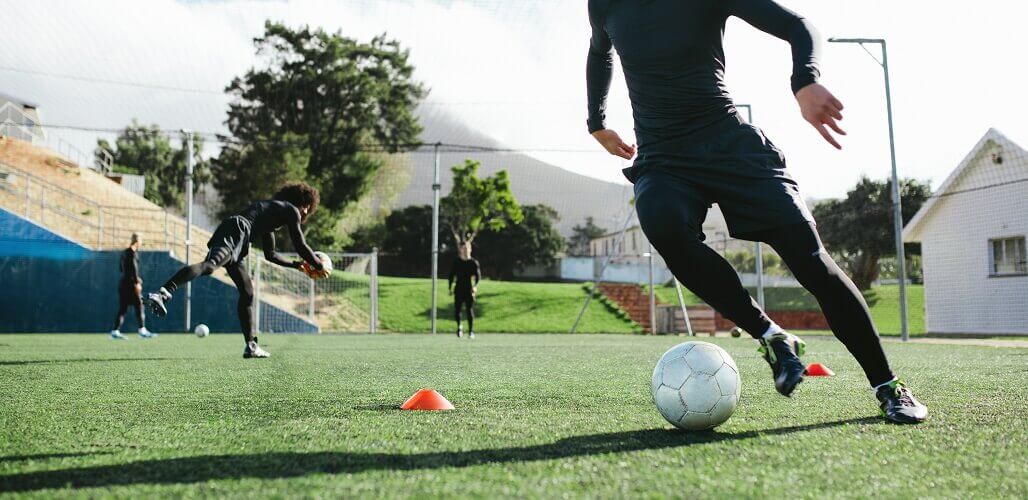Got a pain in your foot? This treatment technique can help!
Have you noticed foot pain during the first few steps after getting out of bed in the morning? How about after other long periods of inactivity? There’s a good chance you’ve developed plantar fasciitis, one of the most common causes of pain on the bottom of the heel. At The Running Physio, we can help resolve your plantar fasciitis, including through the use of shockwave therapy.
Around 10% of Canadians will experience plantar fasciitis at some point. It occurs when the plantar fascia, the ligament that runs along the bottom of your foot, becomes inflamed or irritated, leading to pain. Recent research has shown that degenerative changes are likely the main cause of this condition.
Treatment plans for plantar fasciitis typically involve strengthening the muscles of the foot and calf, applying manual therapy to address pain, or utilizing night splints and orthotics to keep the fascia relaxed. At The Running Physio, our physiotherapists often employ shockwave therapy as an additional treatment option.
Shockwave therapy is an effective, non-invasive method of addressing musculoskeletal issues, especially soft tissue conditions like plantar fasciitis. If you’re struggling with plantar fasciitis, schedule an appointment with us to learn more about how shockwave therapy might benefit you!
Understanding Plantar Fasciitis
Although the plantar fascia is designed to absorb the impact of activities like running, walking, jumping, or playing sports, it sometimes gets pushed to its limits, leading to the irritation of the fascia that causes foot and heel pain.
Plantar fasciitis rarely occurs due to one major injury but instead due to several micro-injuries that add up over time. For this reason, you usually can’t trace it to a single clear-cut cause. Certain activities, like prolonged standing or high-impact movements, can lead to the condition, as can starting or increasing activity. Some people may also just be anatomically prone to developing it.
Plantar fasciitis symptoms are relatively straightforward and generally include the following:
- Pain on the bottom of your foot or heel
- Pain upon moving after a long period of rest (such as getting up in the morning)
- Increased pain after exercise or activity
If you’re uncertain whether or not your foot pain is plantar fasciitis, visit the physiotherapists at our (town) clinic! They can determine the source of your pain and suggest potential treatment options.
What’s Shockwave Therapy, and Why Does it Help?
Extracorporeal shockwave therapy (usually shortened to ESWT or shockwave therapy) uses shockwaves to facilitate the body’s natural healing processes. Sound intense? Don’t worry–shockwaves are just a type of sound wave, and shockwave therapy works similarly to ultrasound technology.
During a shockwave therapy session, one of our physiotherapists will apply a wand to the bottom of your foot to send the shockwaves into the irritated plantar fascia. The shockwaves will facilitate your body’s natural healing processes by promoting blood flow to the area.
Research shows that shockwave therapy is effective at addressing plantar fasciitis. However, it’s most effective when combined with other treatments, especially therapeutic exercises like targeted stretching.
What to Expect When You Come into an Appointment
To begin, one of our physiotherapists will conduct a comprehensive evaluation to determine whether your foot and heel pain is plantar fasciitis or another condition. We’ll discuss your symptoms and medical history, then ask you to perform a series of movement screens and gait analysis tests. This information helps us develop your customized treatment plan.
If we decide that shockwave therapy is the right choice for you, know that a single session typically takes between 15-30 minutes, although most patients will require multiple sessions to see results. You may or may not experience some minor pain or discomfort, although our therapists can adjust the shockwaves to a more comfortable level.
In addition to shockwave therapy, our therapists might suggest the following additional treatment options:
- Strengthening of the foot and calf muscles.
- Targeted exercises to stretch the plantar fascia and other soft tissues in the foot and calf
- Gait corrections to address any walking abnormalities that may contribute to your plantar fasciitis
- Manual therapy to help reduce pain and improve your mobility
- Taping for short-term pain relief
- Orthotics and/or night braces to support and stretch your plantar fascia as you recover
In addition to addressing your current symptoms, our physiotherapists will work with you on strategies to prevent future occurrences of plantar fasciitis. From at-home exercises to modified footwear, we’ll find a solution that works for you!
Make Your Initial Appointment Today!
Plantar fasciitis isn’t life-threatening, but it can cramp your style, preventing you from completing work tasks or engaging in your favorite physical activities. At The Running Physio, we’ll work with you to develop a treatment plan to resolve your condition and get you back on your feet.
Call and Request an appointment with us today to get started!








